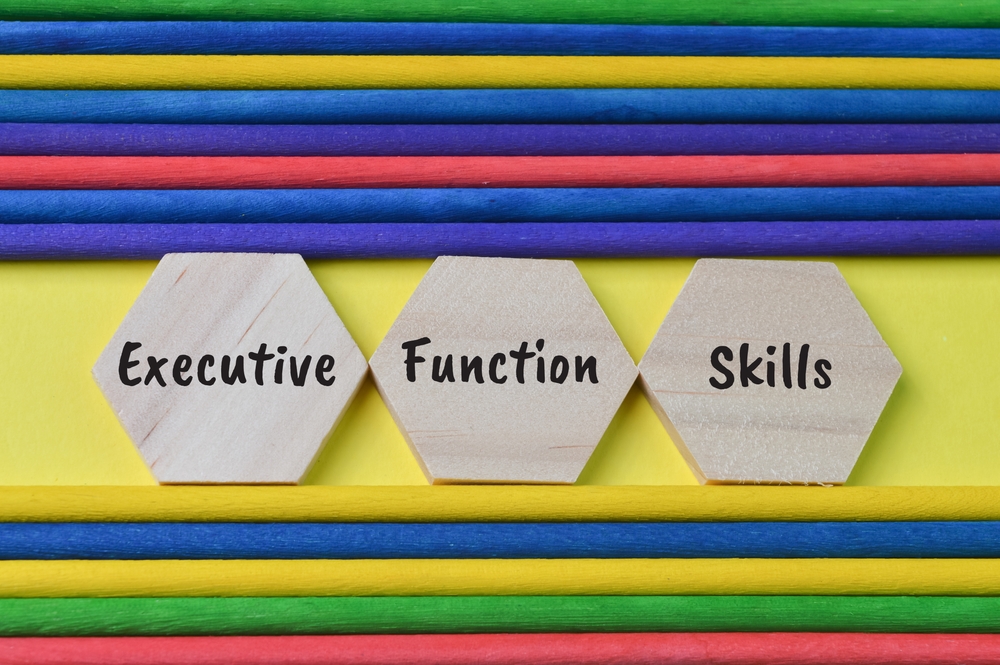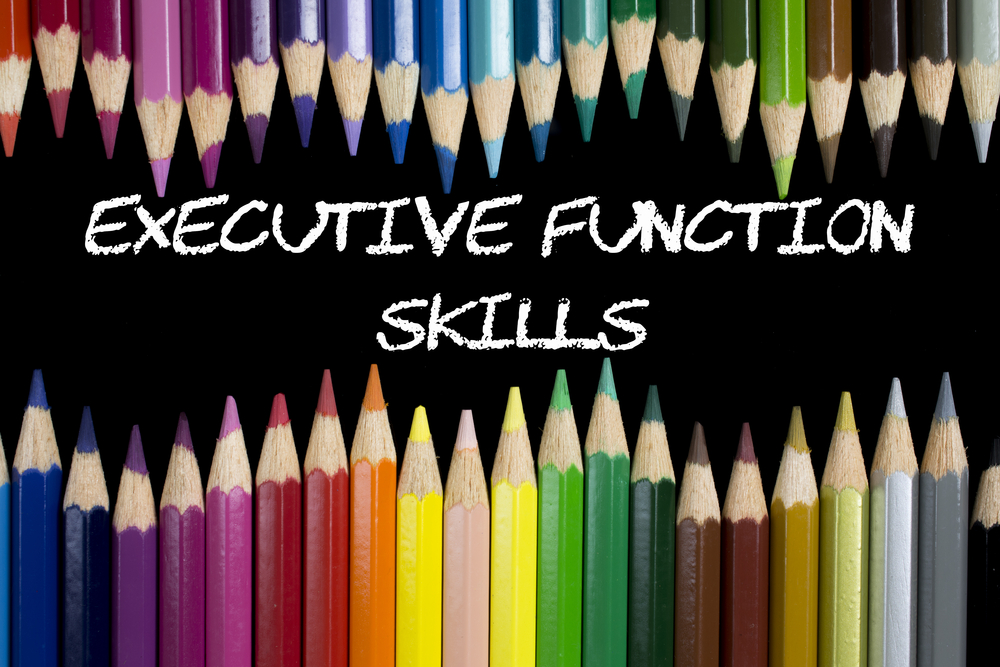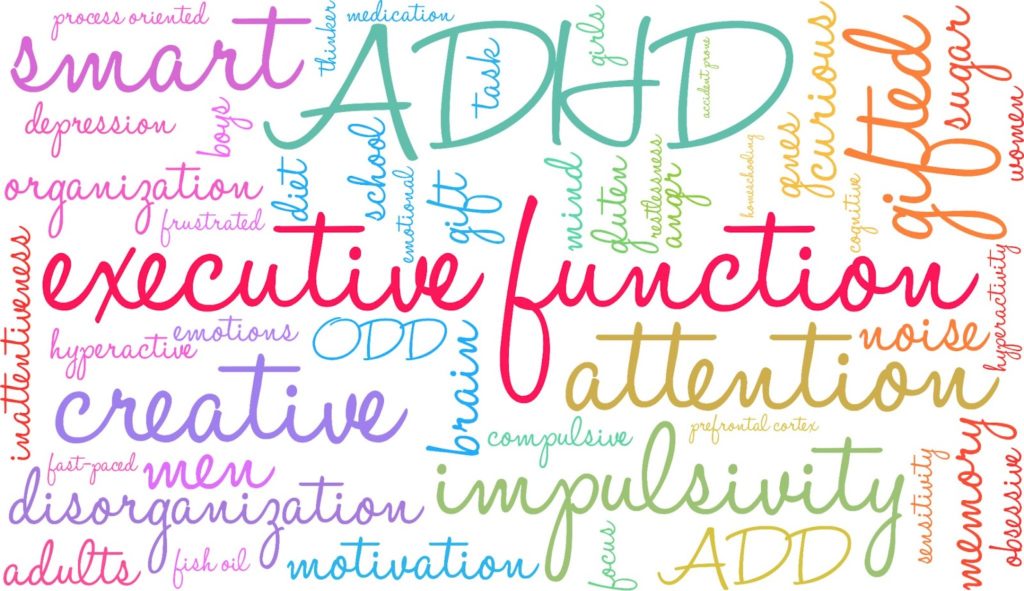
The cluster of skills that fall under the category of executive functioning are vital for all students, but not all students have an easy time developing them. These skills help students in school and beyond.
Some students who are neurodiverse have more challenges developing executive function skills. This doesn’t mean they can’t develop them, just that they need extra guidance and support. Neurodiversity means that everyone develops differently, and some forms of neurodiversity make developing executive function a different process from what many of us think of as “teaching.”

What Is Executive Function?
Executive function is learned and practiced. It is not a natural process. What is gained from executive functioning relates and intertwines early learning and social skills starting in childhood and through adolescence, building a foundation for managing adulthood.
Executive functioning is a set of skills that include:
- Self-control
- Focus
- Planning ahead and meeting goals
- Following complex of multi-step directions
- Prioritizing tasks
- Making informed decisions
- Revising plans
- Looking at things from different angles
The Truth About Executive Dysfunction
Executive dysfunction is not the result of lawfulness or bad behavior. It is an indication of a variety of neurodiverse conditions that include but are not limited to ADD/ADHD, depression, anxiety, bipolar disorder, borderline personality disorder, epilepsy, OCD, and Tourrette’s syndrome. Many of these conditions appear as behavioral problems, but often they have underlying causes that can create learning disabilities. That dyslexia and dyscalculia are also neurodiverse conditions emphasizes this point.
The good news is that building executive skills is like lifting weights for the brain. Executive function is a product of the prefrontal cortex, an area of the brain that regulates emotion and assists in decision making and risk management. Strengthening the prefrontal cortex is like strengthening any muscle. It just requires a different form of exercise.
Executive dysfunction can manifest in a variety of ways. Being unable to discern social cues, stay organized, or be on time are just a few ways executive dysfunction can interfere with everyday life. These are factors that can extend into adulthood if the skills aren’t built early.
As with any talent, some students seem to develop and maintain these skills with ease. Others need help and support rather than the assumption that these skills have not been built out of willfulness or a penchant for misbehavior. Punishing students for executive dysfunction will often discourage them further, creating even more frustration and acting out.
Adapting to Different Learning Styles
Even students with few challenges from neurodiversity learn in ways that best adapt their strengths. Some students are confused by hearing step-by-step instructions, but if allowed to perform the task as it’s being explained, can use this hands-on experience to grasp it. Others need to see a demonstration, or read it to themselves rather than having it explained by another.
Most students find their own best learning style, but students struggling with neurodiversity challenges may have difficulty figuring out their strengths. Fortunately, there are a variety of techniques educators use to help neurodiverse students. These techniques can be applied at home, too, giving parents plenty of opportunities to provide support and encouragement at home.
Here are a few things you can do to help the neurodiverse student in your life.
-
Make Use of Apps
Apps are prevalent all over our portable devices. Mobile phones and tablets have apps that we can use to track how much food we eat, remind us to drink water, and design workout routines for us. Almost everyone uses some app or another to help them navigate through life. Neurodiverse students can benefit from apps in numerous ways.
Organization apps can be used to help neurodiverse students to keep track of due dates and set reminders for classes and appointments. These apps can include fun, familiar characters and rewards for meeting goals.
Learning apps can help teach academic disciplines such as reading, writing and foreign languages in ways that fit neurodiverse learning styles. Using graphics, music, user experience, and gamification, apps can make learning entertaining, giving neurodiverse students a boost of confidence while promoting the sense of playing a game.

-
Vary Your Approach
There are a myriad of ways our technology has enhanced learning, many of which can provide support to neurodiverse students. Apps on mobile devices are merely portable support. At home, smart devices can be added to your home hub to help students manage their time and establish good habits.
Lighting has been shown to have an influence on all of us, as screens have been shown to trigger parts of our brain that keep us awake. Smart lighting can help set a mood for activity, and a mood for winding down.
Video game consoles and computers are providing games that require players to stand up and exercise, maybe even learning skills as varied as fitness, guitar, or dance. Like their mobile counterparts, these can provide new ways of learning that can enhance skills such as practicing multi-step tasks and focusing. Video format has also long been used to demonstrate complex tasks, but smart TVs and video games allow students to participate in the demonstration.
-
Use Visual Aids
Signs are for guiding people, and can be especially useful to support students who are neurodiverse. Signs, pictures and symbols are easily and quickly understood and can help improve executive function skills by associating concepts.
Students who struggle with reading might have an easier time understanding words when they can see them in action and learn to associate the sounds with the letters. Diagrams and lists can help students stay organized in tasks as varied as cleaning up one’s room and putting together a model.
Other visual aids can serve as reminders around the house. Signs and labels can provide cues to perform certain tasks, such as brushing teeth or taking off shoes. Post-It notes have been helping remind people about things for years, and now come in bright colors and designs that can improve organization. A small note with an encouraging word can also provide a boost to self-esteem and social functioning.
-
Involve the Student in Creating Strategies
Every individual student knows what they are comfortable with and what they find enjoyable. That’s why it’s a good idea for each student to be involved in any plan designed to improve executive function skills. If learning is an experience that is fun, neurodiverse students will engage in it more eagerly.
This can take a bit of trial and error. It’s important to keep an eye on how the student responds to different activities. This can help inform the introduction of new activities based on things the student already enjoys. It is vital to work with the student frequently to explore new strategies and re-evaluate the effectiveness of existing strategies.
Further, this can improve the social elements of executive function skills by giving the student a sense of accomplishment. When students can see their progress, it helps them build self-esteem and provides them tools for coping skills.

-
Be Hands-On
Sometimes, a neurodiverse student needs some extra help when it comes to strengthening executive function skills. This means sitting down and working with them directly, explaining things step by step and guiding them all the way through.
When neurodiverse students struggle, it can increase their frustration and demotivate them from learning. Working closely with them in these situations can help teach them to manage their emotions and focus under pressure, while providing them comfort that can also model self-soothing skills.
Building Blocks for Life
Executive function skills are not just for school. They are important tools for navigating college, the workplace, and social situations. Learning them lasts into adulthood, ensuring that kids grow up to navigate the world effectively. Neurodiverse students may face extra challenges, but you can help them adapt and thrive with patience and compassion.

 Español
Español